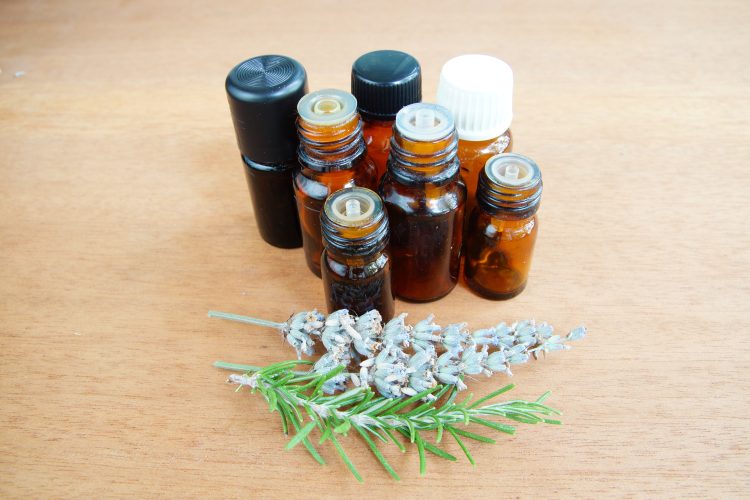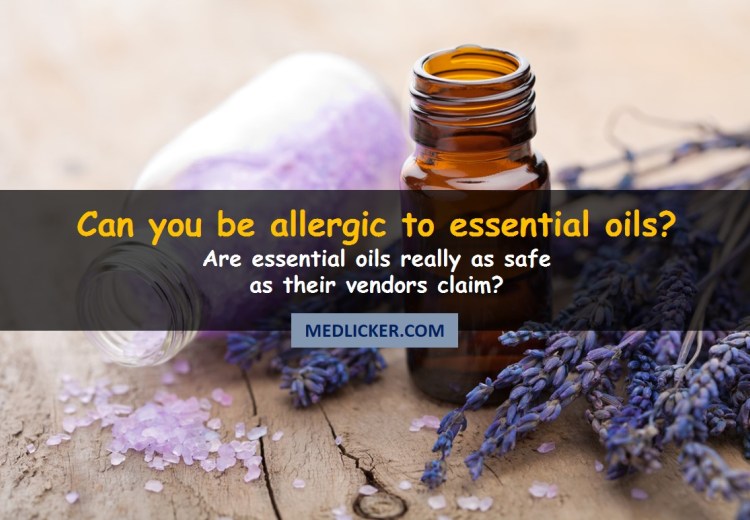Do essential oils trigger allergic reactions?
Some articles on the internet describe pure unadulterated essential oils as natural substances that never spoil and cause no allergies or side effects. But is it true? Can you be allergic to essential oils? Here is a detailed evidence-based article that debunks some dangerous myths about allergies and essential oils.
What are essential oils?
Essential oils are highly concentrated plant oils. They are produced mainly by steam or water distillation of various parts of plants, including roots, flowers, leaves, bark or stems.
The result of the distillation is a highly concentrated essential oil, which has a specific aroma and healing powers, depending on the type of plant from which it was prepared.
Naturopaths use essential oils to treat a variety of problems naturally.
For example, essential oils may help fight fatigue, anxiety or promote healthy sleep.
Some people also recommend using essential oils for the treatment of allergies or infections.
You may use essential oils in three main ways.
Aromatic use means that you just inhale essential oil vapors through your nose.
Topical use is a direct application of essential oils on your skin, and internal use means that you use essential oils as food ingredients or supplements.
While some studies show that some essential oils have healing powers (such as tea tree oil, which has high antimicrobial effects and kills some types of bacteria, viruses, and fungi), evidence of the effectiveness of other essential oils is often anecdotal and you should not put undue reliance on their medicinal properties (1).
Can essential oils cause allergies?
Although some of the healing effects of essential oils are scientifically proven, many myths are surrounding these substances as well.
One of these myths is the claim that essential oils can not cause allergies because they contain purely natural herbal substances.
Unfortunately, natural substances may cause severe allergic reactions on the skin (when applied topically) and even an anaphylactic shock (when ingested).
To understand why essential oils may cause allergies, we need to recall something from chemistry.
The active ingredients of essential oils are mainly monoterpenes and terpenoids and sesquiterpenes and terpenoids. These include carbon atoms and also oxygen, in the form of alcohol, ketone or aldehyde group (2).
Some active substances of essential oils also contain double bonds between carbon atoms commonly found in unsaturated fatty acids and other chemicals.
When you expose monoterpenoids and sesquiterpenoids to air (for example after opening a bottle of essential oil), oxidation occurs, which eventually results in oil spoiling.
It is similar to wine, which turns to vinegar if not consumed rapidly after opening.
Alcohol groups in monoterpenoids and sesquiterpenoids thus turn into aldehydes and acids.
Oxidation not only reduces the therapeutic effects of essential oils but also generates substances and allergens that may irritate the skin and cause an allergic reaction.
Spoiled (oxidized) essential oils may cause various skin rashes and allergies.
The second reason why essential oils cause allergic reactions is haptens.
Haptens are small molecules that bind to proteins in the body and produce so-called haptenated proteins.

Essential oils may cause allergic reactions
These often cause an immune response and cause allergic reactions.
An example of a hapten that can cause a severe anaphylactic reaction is penicillin, a commonly used antibiotic (3).
If you are allergic to penicillin, you should tell your doctor and get alternative antibiotics when you need.
Another substance that acts as a hapten and triggers an immune response when bound to human proteins in the skin is nickel.
Nickel is commonly used to make jewelry and a person who has a nickel allergy should not wear jewelry made from this material (4).
Which essential oils cause the strongest allergic reactions?
You should know that allergic reactions to essential oils are rare.
But it does not mean that you do not need to be careful when using essential oils.
Studies suggest that the risk of allergic reactions is higher for some essential oils.
For example, geranium essential oil may cause an allergic reaction if not stored properly.
Oxidation of geranium essential oil generates a potent allergen called geraniol (5).
Likewise, tea tree essential oil may cause an allergic reaction because oxidation produces epoxides, which are also potent allergens (6).
Finally, the lavender essential oil contains linalyl acetate.
Oxidation turns linalyl acetate to hyperoxides and epoxides.
Both of them can cause severe allergic reactions (7).
Coconut essential oil contains DEA cocamide (diethanolamine) fatty acids that can cause contact allergies.
Because beauty companies use this oil in their products, you should be very careful when applying coconut essential oil (8).
Peppermint oil may also cause skin and respiratory side effects and allergic reactions, including contact dermatitis. It contains menthol, which is a potent allergen (9).
Lavender, jasmine, rosewood, laurel, eucalyptus and citrus fruit essential oils may also cause contact dermatitis and allergic reaction on the skin (10).
While the above-mentioned essential oils are most likely to cause allergic reactions, any essential oil may trigger an immune response.
All essential oils may contain allergens, which may cause a severe allergic reaction (11).
A recent study has found that nearly 80 essential oils may cause contact allergies (12).
Therefore, you need to be careful and use essential oils only with the prior consent of your doctor.
Symptoms of an allergic reaction to essential oils
Symptoms of an allergic reaction to essential oils depend on how you use the oils.
Skin contact allergy to essential oils
If you use essential oils topically and apply them directly to the skin, the most common allergic reaction is contact dermatitis.
Symptoms of allergic contact dermatitis are both local and systemic and include red pimples on the skin (rash), swelling and itching at the point of contact, trouble breathing, tongue tingling, etc. (13).
The second typical skin manifestation of allergy to essential oils is urticaria (hives), which is an inflammation of the skin caused by excessive release of histamine from the immune system cells.
Histamine makes small blood vessels "leak", which results in swelling of deep layers of the skin (angioedema).
Other symptoms of urticaria include red itchy bumps on the skin and "blanching" (when you press the bump it turns white).
Respiratory allergic reaction to essential oil
The active ingredients of essential oils that you inhale may cause respiratory allergies.
Symptoms of respiratory allergies to essential oils include nasal discharge, sneezing, wheezing and, in severe cases, asthma attacks or anaphylaxis.
Anaphylaxis is a severe allergic reaction, which is manifested by itchy rash, swollen throat and tongue, shortness of breath, vomiting and sudden drop in pressure (14).
It is a life-threatening condition that requires immediate medical attention.
Allergic reaction to ingested essential oil
Experts usually do not recommend ingesting essential oils, but if you do so, you may be at risk of an allergic reaction.
Symptoms of allergic reaction to ingested essential oil are vomiting, diarrhea, skin rash, or breathing difficulties.
If you feel any of these symptoms after ingestion of an essential oil, seek immediate medical advice.
How to use essential oils safely?
Essential oils have many benefits for your health, but they may also cause allergic reactions.
Therefore it is necessary to use them correctly.
Here are some practical tips on how to use essential oils safely.
- Buy only quality essential oils from renowned manufacturers (Doterra, etc.).
- Never use undiluted essential oil, but always dilute it before use, following the manufacturer's instructions. It is best to add a few drops of essential oil to the moisturizer or lotion and then apply it to the skin.
- Do not apply essential oils to your eyes or ears (or onto the skin close to your eyes).
- Do not use essential oils on the damaged or injured skin.
- If you use essential oils in cooking recipes instead of spices or herbs, add only a few drops to the food.
- Before using an essential oil on the skin, always test for skin allergic reaction by applying the oil on s small area of skin. If allergy symptoms (rash, itching, shortness of breath, dizziness, etc.) appear after the application of essential oil, stop using the oil immediately and seek medical attention.
- Store essential oils properly, in a dry, dark and cool place and do not use them if they are older than three (3) years.
The bottom line
You can be allergic to essential oils.
Although essential oils are highly concentrated extracts from natural plant materials, they can be oxidized.
The use of oxidized (spoiled) essential oil increases the risk of an allergic reaction. The maximum lifespan of essential oils is 3 years.
Furthermore, essential oils contain haptens that bind to human proteins and can activate the immune response of your body.
Use essential oils only with a prior consent of your doctor, and if you have any symptoms of allergies, stop using the oil and seek a prompt medical advice.
| Written by: | Michal Vilímovský (EN) |
|---|---|
| Education: | Physician |
| Article resources: | See numbered references in the article. |
| Image resources: | Stockphotosecrets.com |
| Published: | April 2, 2018 at 8:25 AM |
| Next scheduled update: | April 2, 2020 at 8:25 AM |
Get more articles like this in your inbox
Sign up for our daily mail and get the best evidence based health, nutrition and beauty articles on the web.


Ache in left arm that you should not ignore
Alkaline water dangers: why you should not drink it
How to Avoid Sleepiness While Studying?
23 Foods That Increase Leptin Sensitivity
Low dopamine (e.g. dopamine deficiency): causes, symptoms, diagnosis and treatment options
Swollen taste buds: the ultimate guide to causes, symptoms and treatment
Thin endometrial lining: causes, symptoms, diagnosis and treatment
Pimples inside nose: the complete guide
Holes in tonsils: definition, symptoms, treatment and prevention
How to deal with an ingrown hair cyst
Allegra vs. Zyrtec vs. Claritin
Allergy to penicillin and alternative antibiotics
How to get rid of phlegm (excessive mucus) in throat? Detailed guide to medical and home remedies, symptoms and causes
What causes stomach ache after meals?
Liver blood test results explained